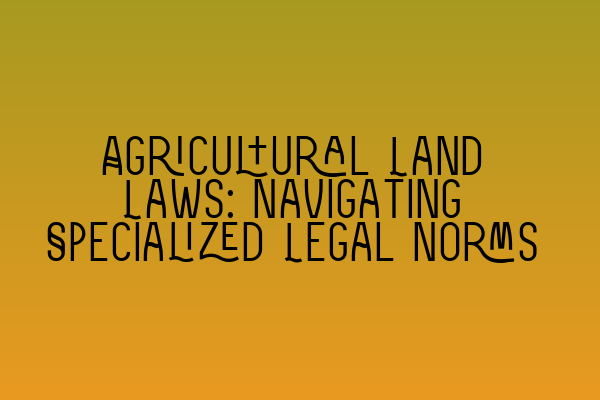Agricultural Land Laws: Navigating Specialized Legal Norms
As a solicitor specializing in property law, it is essential to have a comprehensive understanding of the specific legal norms governing agricultural land. Agricultural land laws have their own set of regulations and considerations that differ from those applicable to residential or commercial properties. Navigating this specialized terrain requires expertise and knowledge of the intricacies involved.
In this blog post, we will discuss the key aspects of agricultural land laws that every property solicitor should be familiar with. By exploring these specialized legal norms, we aim to provide valuable insights to help you navigate agricultural land cases with ease.
The Importance of Agricultural Land Laws
Agricultural land represents a significant portion of the UK’s landmass and plays a crucial role in the country’s economy. The laws and regulations governing agricultural land have been put in place to promote sustainable farming practices, protect the environment, and ensure the fair treatment of farmers and landowners.
Understanding these laws is particularly important when dealing with transactions involving agricultural land, such as buying or selling farms, negotiating farm leases, or obtaining planning permission for agricultural development. Failure to comply with the specific legal requirements can lead to legal disputes, financial losses, and even reputational damage.
The Common Agricultural Policy (CAP)
The Common Agricultural Policy (CAP) is a set of regulations implemented by the European Union (EU) to govern agricultural activities. Although the UK has now left the EU, the CAP continues to influence agricultural land laws until the new agricultural policy is fully implemented in the post-Brexit era.
Under the CAP, various schemes and subsidies are provided to support farmers and incentivize sustainable agricultural practices. As a property solicitor, it is essential to stay updated on the current CAP regulations, as they can impact decisions relating to agricultural land transactions, subsidies, and compliance requirements.
Agricultural Holdings Act 1986
The Agricultural Holdings Act 1986 governs agricultural tenancies and provides a legal framework for the relationship between agricultural landowners and tenants. This legislation covers aspects such as rent, succession rights, repair obligations, and termination of tenancies.
Whether you are advising a landowner on the terms of an agricultural lease or representing a tenant in negotiating fair and equitable lease arrangements, understanding the provisions of the Agricultural Holdings Act 1986 is crucial. It ensures that your clients’ rights and obligations are protected, and any potential disputes are mitigated.
Environmental Regulations
Environmental regulations play a significant role in agricultural land laws. As a solicitor, you need to have a good grasp of the environmental obligations and restrictions imposed on agricultural landowners. These obligations aim to prevent environmental harm, protect natural habitats, and promote sustainable land use.
For instance, agricultural landowners may need to comply with regulations related to water pollution prevention, pesticide use, livestock waste management, and wildlife conservation. Familiarity with these regulations and their implications ensures that your clients are in full compliance, minimizing the risk of legal complications.
Land Use Planning and Development
Another vital area of agricultural land laws is land use planning and development. Whether your client wants to diversify their farming activities, convert agricultural buildings into residential properties, or erect new structures on their land, navigating the complex web of planning permissions and development regulations is essential.
Local planning authorities have a responsibility to balance sustainable development with environmental protection, community interests, and the needs of agricultural landowners. As a property solicitor, you play a crucial role in advising your clients on navigating the planning process, ensuring compliance with relevant policies and regulations.
Conclusion
Agricultural land laws present unique challenges and considerations for property solicitors. Understanding the specialized legal norms governing agricultural land, such as the Common Agricultural Policy (CAP), the Agricultural Holdings Act 1986, environmental regulations, and land use planning, is crucial for success in this field.
The complexities of agricultural land laws require solicitors to stay updated on current regulations, seek ongoing professional development, and maintain a comprehensive understanding of the ever-changing legal landscape. By doing so, you can provide your clients with the expert advice they need to navigate agricultural land transactions effectively.
At SQE Property Law & Land Law, our expert solicitors combine their in-depth knowledge of agricultural land laws with extensive experience in property matters. We are committed to providing high-quality legal services tailored to our clients’ specific needs. Contact us today to discuss your agricultural land requirements and ensure a seamless legal experience.
